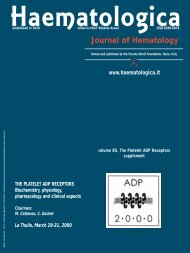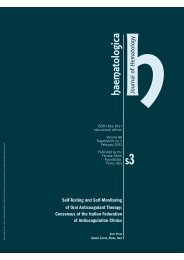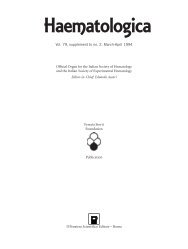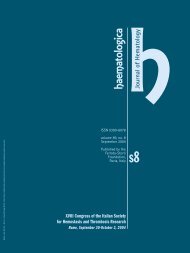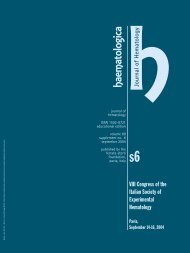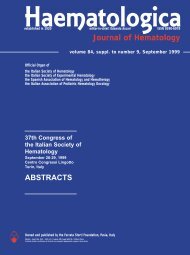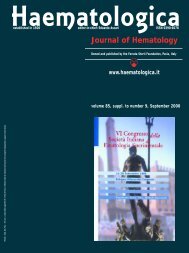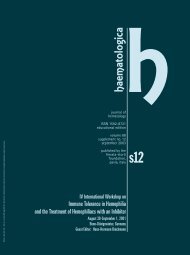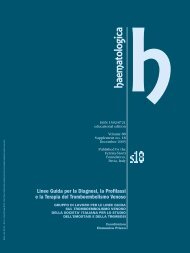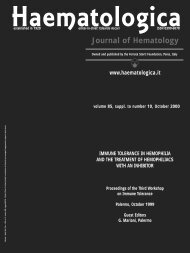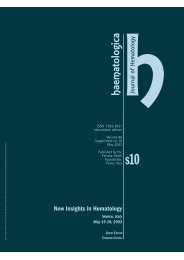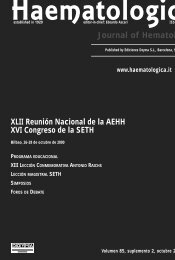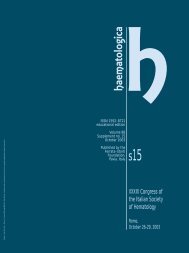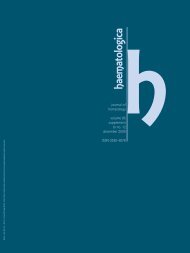Haematologica 2003 - Supplements
Haematologica 2003 - Supplements
Haematologica 2003 - Supplements
Create successful ePaper yourself
Turn your PDF publications into a flip-book with our unique Google optimized e-Paper software.
11.5 CC 4047, PS 341 and arsenic trioxide<br />
366<br />
CC4047 (Actimid), a new immunomodulatory agent is<br />
well tolerated and has anti-myeloma activity in patients<br />
with relapsed / refractory multiple myeloma<br />
Matthew Streetly,Richard W Jones,Rebecca<br />
Sampson,Kavita Raj,Stephen A Schey<br />
Department of Haematology, Guys Hospital, Guys and St.<br />
Thomas` NHS Trust, London, UK SE1 9RT<br />
The anti-myeloma activity of thalidomide is well established.<br />
However side effects such as somnolence, constipation and<br />
neuropathy are common thereby limiting its usefulness. CC4047<br />
(Actimid) is a synthetic analogue of thalidomide with<br />
immunomodulatory activity. It has been observed to have a 5000<br />
fold greater inhibition of Tumour Necrosis Factor Alpha activity<br />
than thalidomide and an excellent toxicity and safety profile in<br />
human volunteer studies. We present the results of a Phase I dose<br />
escalation study of this agent (1mg, 2mg, 5mg, 10mg) in patients<br />
with relapsed /refractory myeloma to identify the maximum<br />
tolerated dose of CC4047 when given orally for 4 weeks. The<br />
secondary endpoint was disease response.<br />
24 patients with a median age 66 years (range 49 – 82) and a<br />
median of 3 (range 1 – 6) previous treatment regimens including<br />
previous high dose therapy (5 patients) and/or thalidomide (7<br />
patients) entered the study. During the study period the maximum<br />
tolerated dose was established at 2mg/day. Grade IV<br />
neutropaenia developed in 2/3 patients on 10mg/day, 1/6 patients<br />
on 5mg/day and 2/9 patients on 2mg/day. Neutropaenia resolved<br />
in all patients within 4 weeks of discontinuation of treatment.<br />
Furthermore 1 patient developed a lower limb deep venous<br />
thrombosis (DVT) at 3 weeks and was withdrawn from the study<br />
(the patient was subsequently shown to have malignant<br />
melanoma related lymphadenopathy proximal to the site of<br />
thrombosis). Following the study period 20/24 patients continued<br />
treatment on a compassionate use basis (patients on 10mg during<br />
trial reduced dose to 5mg). Treatment was withdrawn in 7 of<br />
these patients (4 due to neutropaenia, 2 due to DVT, 1 due to<br />
renal failure) and 1 patient withdrew from the study. The median<br />
duration of treatment was 25 weeks (3-96 weeks).<br />
All 24 patients are eligible for assessment of response on an<br />
intention to treat basis. 13/24 patients (54%) achieved >50%<br />
reduction in paraprotein, of these 4 patients (16%) had complete<br />
disappearance of paraprotein and 2 patients (8%) had a 75-99%<br />
reduction in paraprotein. A further 3/24 patients (24%) achieved a<br />
25-50% reduction and 8/24 patients (33%) had stable disease for<br />
at least 4 weeks. The median time to achieve maximum response<br />
(>25% reduction) was 23 weeks (4 – 51) and the median duration<br />
of response was 11 weeks (0 – 53). Although quality of life was<br />
not formally assessed most patients reported a subjective<br />
improvement in wellbeing irrespective of response. 6/24 (25%)<br />
patients developed progressive disease whilst on treatment (1<br />
previous CR, 1 previous VGPR, 2 previous PR and 2 stable<br />
disease).<br />
Conclusion: CC4047 is well tolerated with acceptable side effect<br />
profile. There is good evidence for anti-myeloma activity. Studies<br />
are ongoing to further define the optimum dosing schedule and<br />
further studies are justified to fully assess the efficacy of this drug<br />
both as a single agent or in combination with other treatments.<br />
367<br />
THALIDOMIDE ANALOGUE CC-4047 IS EFFECTIVE IN<br />
THE TREATMENT OF PATIENTS WITH RELAPSED AND<br />
REFRACTORY MULTIPLE MYELOMA (MM) AND<br />
INDUCES T CELL ACTIVATION AND IL-12<br />
PRODUCTION<br />
M Streetly1, JB Marriot2, PA Fields1, RW Jones1, K Raj1,<br />
IA Clarke2, K Dredge2, AG Dalgleish2 & SA Schey1<br />
1Guy’s & St Thomas’ NHS Trust, London, UK and 2Division of<br />
Oncology, St George’s Hospital Medical School, London, UK.<br />
Multiple myeloma presently remains an incurable disease.<br />
Because of this newer treatment strategies have been sought to<br />
help improve outcome. One such strategy is immunomodulation,<br />
which has shown promise in this disorder based on studies with<br />
thalidomide. The immunomodulatory drug CC-4047 (Celgene,<br />
ACTIMID) is a promising anti-tumour agent and is likely to<br />
enhance the anti-myeloma effects observed during the treatment<br />
of patients with thalidomide. It has been previously shown to be<br />
anti-angiogenic in vivo, and can augment tumour specific<br />
immunity in vivo and may also induce cell cycle arrest and<br />
apoptosis of multiple myeloma (MM) cells in vitro. It has an<br />
excellent toxicity and safety profile in human volunteer studies,<br />
although it has not previously been assessed in patients with MM.<br />
Our group conducted a phase I dose escalation study for a period<br />
of 4 weeks of treatment with CC-4047 (1mg-10mg/day) in the<br />
first 18 patients on study with relapsed/refractory MM. The<br />
objectives were to 1) Identify the maximal tolerated dose (MTD)<br />
and to evaluate the safety of CC4047 when given for 4 weeks<br />
duration at doses ranging from 1-10mg or the MTD, whichever is<br />
lower in patients with refractory or relapsed MM. 2) to evaluate<br />
activity of CC-4047 in patients with MM; and 3) to identify the<br />
effects of CC-4047 on cytokine production. MTD was established<br />
at 2mg/day. All patients reported a subjective improvement in<br />
their quality of life while on treatment. The M-protein response<br />
was 25-50% in 7/18 (39%) and >50% in<br />
3/18 (17%). On a named patient basis (after 4 weeks treatment),<br />
8/18 developed >50% response, including one complete response<br />
(CR) and two near CRs. We assessed the effect of CC-4047 on<br />
immunological activation in these patients. In 17/18 patients,<br />
peripheral blood CD4+ve and CD8+ve T cells greatly increased<br />
their expression of the memory cell and activation marker<br />
CD45RO, while expression of the mutually exclusive isoform,<br />
CD45RA was strongly decreased. Serum levels of sIL-2 receptor<br />
were increased, indicating IL-2 mediated T cell costimulation and<br />
increased levels of IL-12, most probably from monocytes and<br />
dendritic cells, were observed suggesting the generation of a CD4<br />
induced Th1-type response. There was also evidence of increased<br />
numbers of CD56+, CD3- NK cells in some subjects. However,<br />
there were no effects on serum levels of IL-6 nor on the levels of<br />
the pro-angiogenic factors, IL-8, VEGF or βFGF. In conclusion,<br />
CC-4047 appears to be safe and highly effective in the treatment<br />
of patients with relapsed/refractory MM and induced immune<br />
activation in the majority of patients. Further ongoing studies are<br />
being performed to dissect out and immune characterise of these<br />
effects.<br />
S252



